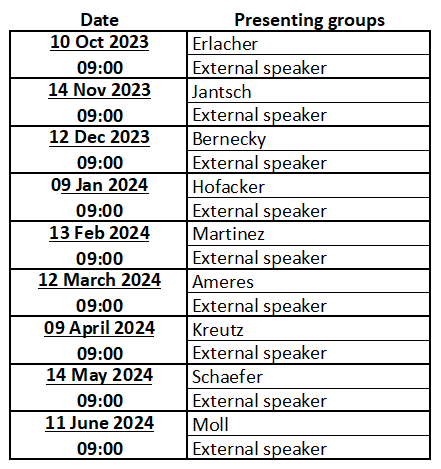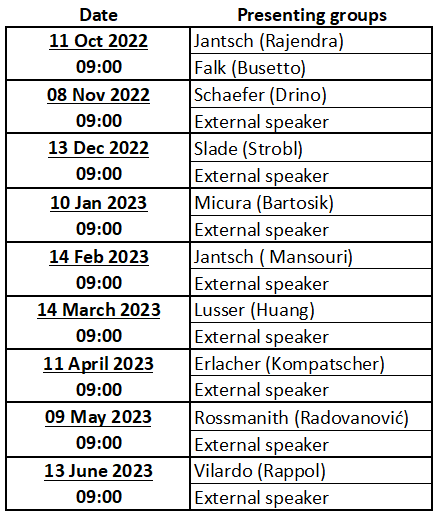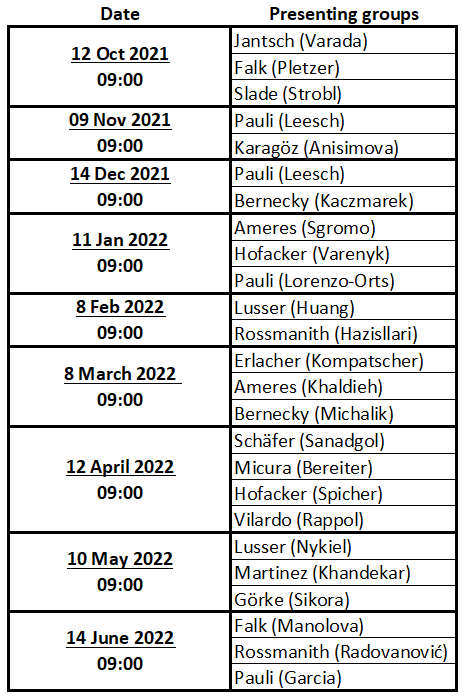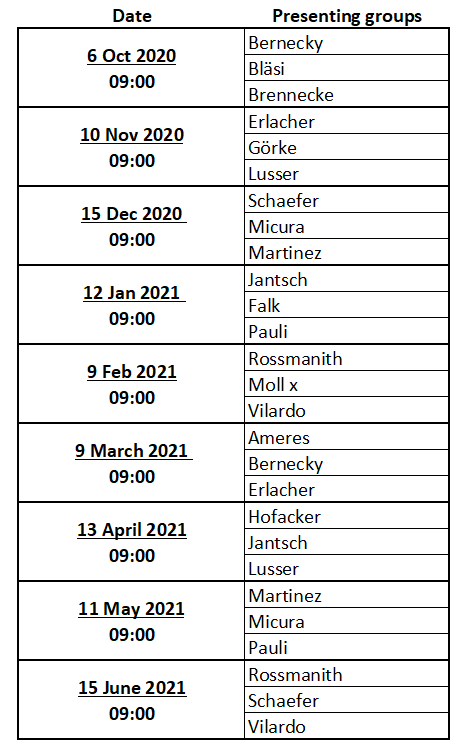News
MID-TERM MEETING - The first four years
The mid-term meeting of RNA DECO was organized at the CCB in Innsbruck February 1st and 2nd.
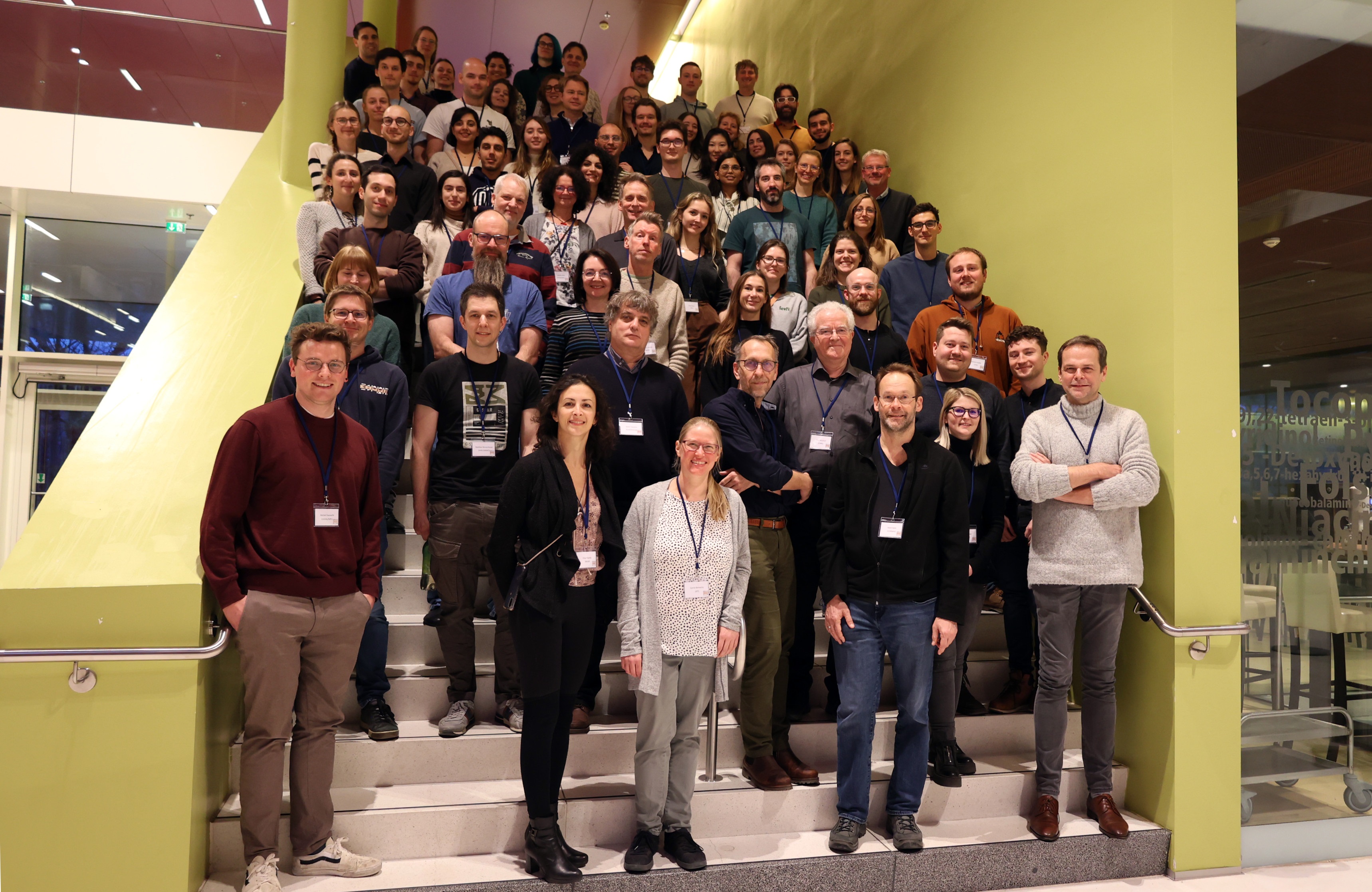
RNA-DECO is successfully extended for another four years
The application for extension of the research network RNA-DECO was succsessfully funded for the coming four years, 2024-2028.
Nobel Prize for Medicine awarded for research on RNA-modifications
Katalin Karikó and Drew Weissmann get awarded the Nobel Prize for Medicine 2023 for their discoveries showing that RNA modifications introduced into RNA-based vaccines can successfully prevent activation of the innate immune system against the RNA itself.
Branimir Ayvazov successfully completed an internship!
Branimir Ayvazov from Javier Martinez´s lab successfully completed an internship on “Characterization of the ANGEL2-PRMT1 protein complex”.
Renata Kleinova defended her Ph.D. thesis successfully!
Renata Kleinova from Michael Jantsch’s lab successfully defended her Ph.D. thesis on “The ADAR1 editome reveals drivers of editingspecificity for ADAR1-isoforms”.
Invited speaker Ramesh PILLAI
Ramesh PILLAI gave a talk at the 17th Microsymposium on RNA Biology Vienna.
4th Annual SFB RNA DECO Retreat
The 4th SFB RNA DECO annual retreat took place at Schlosshotel Mondsee in Salzburg on 27th and 28th of April providing an overview of current research in the field of RNA especially chemical modifications of RNA.
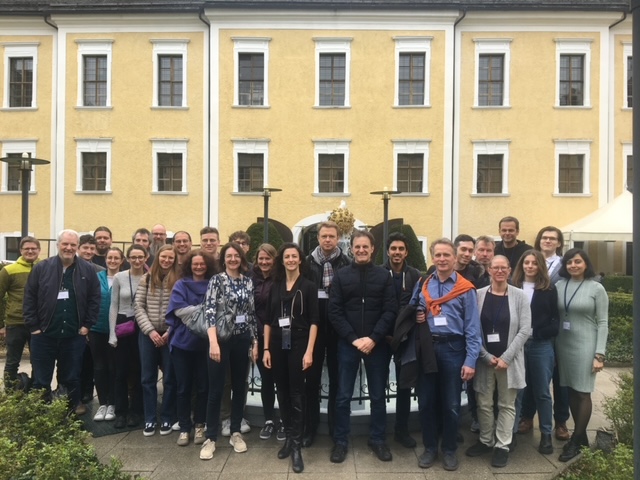
VIENNA RNA CONFERENCE
The VIENNA RNA CONFERENCE: MODIFICATION AND PROCESSING took place from the 26th to the 29th of OCTOBER 2022 in Vienna.
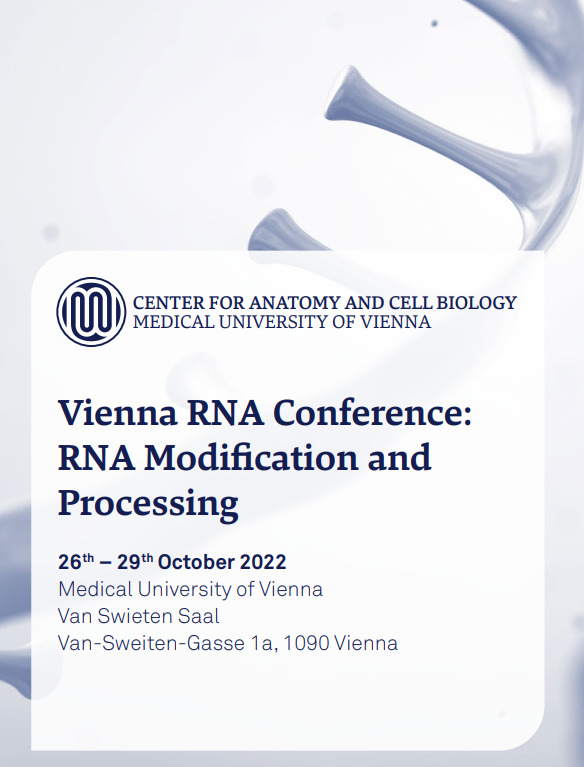
Valentina Stuchlik defended her master thesis successfully!
Valentina Stuchlik from Elisa Vilardo’s lab successfully defended her master thesis on “Investigating the role of Archease on tRNA methylation by NSUN2 in mammals”.
Zsuzsanna Pinter defended her diploma thesis successfully!
Zsuzsanna Pinter from Matthias Schaefer’s lab successfully defended her diploma thesis on “Quantitative Bestimmung von nicht-kodierenden RNAs in den Spermatozoen der Maus-eine explorative experimentelle Studie”.
3rd Annual SFB RNA DECO Retreat
The 3rd SFB RNA DECO annual retreat took place at at Vienna Biocenter in Vienna, on the 23rd and 24th of June 2022 providing an overview of current research in the field of RNA especially chemical modifications of RNA.
Maximilian Kohl defended his master thesis successfully!
Maximilian Kohl from Matthias Erlacher’s lab successfully defended his master thesis on “Translation initiation at ambiguous start sites: setting the right frame”.
Nikolaus Beer defended his master thesis successfully!
Nikolaus Beer from Stefan Ameres’s lab successfully defended his master thesis on “An inducible dual-guide CRISPR/Cas9 approach resolves the cellular assembly and functions of mammalian RNA exosome subunits”.
Moritz Leitner defended his master thesis successfully!
Mortiz Leitner from Javier Martinez´s lab successfully defended his master thesis on “The post-translational fate of human ANGEL2”.
Moritz Staltner defended his Ph.D. thesis successfully!
Moritz Staltner from Stefan Ameres’s lab successfully defended his Ph.D. thesis on “Massive parallel mRNA tethering by ORF-trap examines the post-transcriptional gene regulatory proteome in mouse embryonic stem cells”
SFB RNA Deco Meeting Innsbruck
An in person meeting as part of the SFB RNA Deco Seminar Series was organized at 11th March 2022 in Innsbruck.
Rozi Mkrtchyan defended his bachelor thesis successfully!
Rozi Mkrtchyan from Javier Martinez´s lab successfully defended his bachelor thesis on “PYROXD1, a novel oxido-reductase that protects the tRNA ligase from oxidation”.
SFB RNA Deco Meeting Vienna
An in person meeting as part of the SFB RNA Deco Seminar Series was organized at 14th January 2022 in Vienna.
Melanie Brunner defended her master thesis successfully!
Melanie Brunner from Alexandra Lusser´s lab successfully defended her master thesis on “Metabolic labeling of mRNA using different prodrugs”.
Bugra Yaman defended her master thesis successfully!
Bugra Yaman from Javier Martinez´s lab successfully defended her master thesis on “Gene expression analyses of zebrafish angel proteins”.
Laura Borac defended her master thesis successfully!
Laura Borac from Matthias Schaefer’s lab successfully defended her master thesis on “Establishment of a fluorescence in situ hybridization-based methodology for the visualization of specific tRNA-derived fragments”.
2nd Annual SFB RNA DECO Retreat
The 2nd SFB RNA DECO annual retreat took place at Innsbruck, Tyrol from the 17th to 19th of September 2021 providing an overview of current research in the field of RNA especially chemical modifications of RNA.
Gregor Diensthuber defended his master thesis successfully!
Gregor Diensthuber from Michael Jantsch’s lab successfully defended his master thesis on “Deciphering the crosstalk between A-to-I editing and m6A”.
Thomas Spicher defended his master thesis successfully!
Thomas Spicher from Ivo Hofacker’s lab successfully defended his master thesis on “Computational estimation of energy parameters for RNA folding“.
Susanne Böhler defended her bachelor thesis successfully!
Susanne Böhler from Alexandra Lusser´s lab successfully defended her bachelor thesis on “Characterization of Archease knock-down ESCs”.
Aleksej Drino defended his Ph.D. thesis successfully!
Aleksej Drino from Matthias Schaefer’s lab successfully defended his Ph.D. thesis on “Biochemical identification of protein-tRNA fragment interactions”.
1st Annual SFB RNA DECO Retreat
The 1st SFB RNA DECO annual retreat took place at Schlosshotel Mondsee in Salzburg on the 7th & 8th of September providing an overview of current research in the field of RNA especially chemical modifications of RNA.
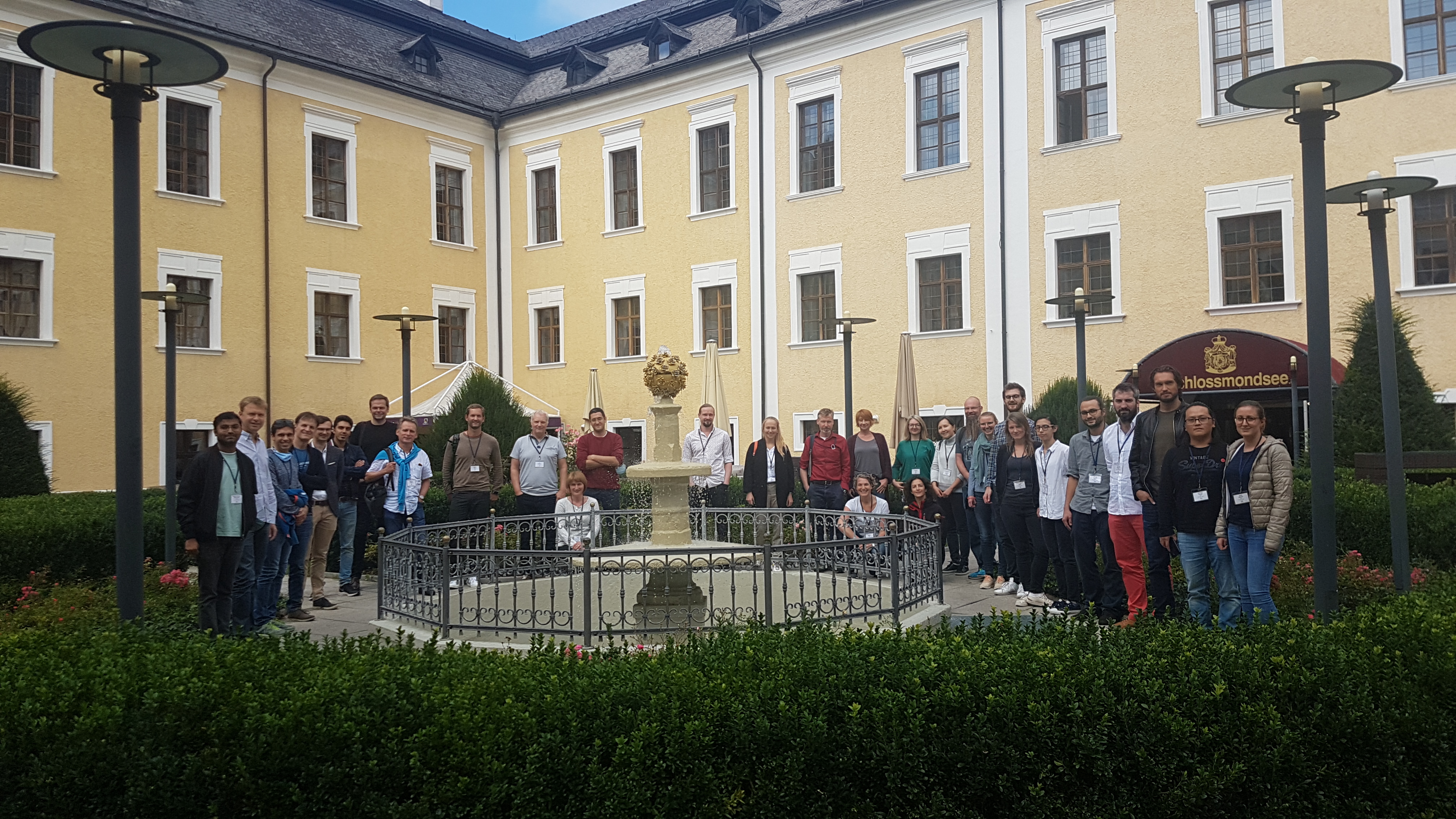
FWF establishes new specialist research area for RNA modifications
The Austrian Science Fund (FWF) is establishing a new specialist research area called RNA-DECO. Over the next four years, total funding of over €4 million will be provided to fund a total of 12 research groups, who will study the chemical modification of ribonucleic acid (RNA). Five of these research groups (Walter Rossmanith, Matthias Schäfer, Elisa Vilardo, Javier Martinez, Michael Jantsch) are based at MedUni Vienna. Overall project leader is Michael Jantsch, Head of MedUni Vienna’s Centre for Anatomy and Cell Biology.
Sabrina Summer defended her Ph.D. thesis successfully!
Sabrina Summer from Walter Rossmanith’s lab successfully defended her Ph.D. thesis on “YBEY is an essential biogenesis factor for mitochondrial ribosomes”.
Matthias Villunger defended his bachelor thesis successfully!
Matthias Villunger from Alexandra Lusser´s lab successfully defended his bachelor thesis on “Characterization of RNA methyltransferase knock-out cells”.
Dem Lebenszyklus von Boten-RNA auf der Spur
Forscherinnen und Forscher der Innsbrucker Universitäten haben ein vor drei Jahren entwickeltes Verfahren zur Analyse von Boten-RNA in der Zelle gemeinsam weiterentwickelt. In der Fachzeitschrift Angewandte Chemie International Edition demonstrieren sie, wie mit einem zusätzlichen chemischen Label Produktion und Abbau von Boten-RNA detailliert analysiert werden können.

